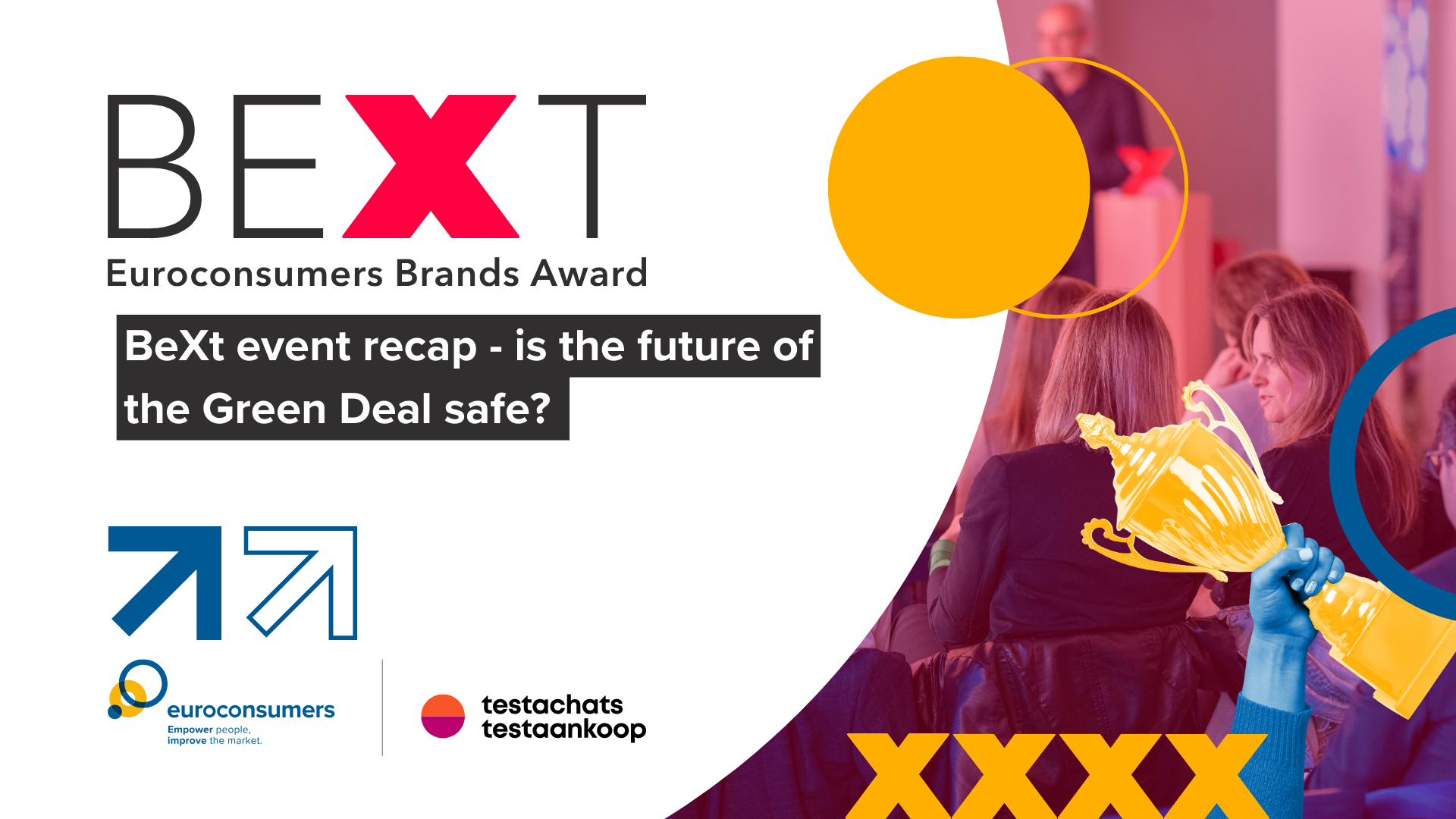This website uses cookies so that we can provide you with the best user experience possible. Cookie information is stored in your browser and performs functions such as recognising you when you return to our website and helping our team to understand which sections of the website you find most interesting and useful.
BeXt event recap – is the future of the Green Deal safe?

Elections for both the European Parliament and the Belgian legislature take place in June 2024 in what will be a critical year for climate politics in the EU.
We’ve covered the car sector pushback on Euro 7 emissions reduction measures just months after Germany’s veto on the banning of new combustion engine car sales by 2035. There’s been resistance from the agro-food industry to the EU’s Farm to Fork strategy, another major component of the Green Deal. European Commission President, Ursula Von Der Leyen’s State of the Union address has been read by some as laying the ground to lower green ambitions as she prepares for re-election.
Elections 2024: to be green or not to be green?
Internationally COP28, due to be held in the United Arab Emirates, is already subject to some controversy over the choice of president. Then there are elections in the US and UK where populist leaders are likely to pitch freedom of choice and lower bills in the short term over the more difficult message of the challenges and benefits of a low carbon transition in the long term.
With the global COP 1.5 degree target reaffirmed in 2022, the question of whether to be green or not to be green will be firmly on the ballot box no matter where you are in the world. Board rooms are watching closely too, with national targets and financing heavily directing their investment in new infrastructure, energy supply, product design and pricing. National and regional governments are not afraid to compete with subsidies to gain the advantage in industries of the future like electric vehicles and batteries.
Against this backdrop, Euroconsumers’ annual BeXt awards event last week looked at EU leaders and politicians’ plans and to celebrate the efforts that forward thinking companies are making to deliver quality, durable and affordable products to the 450 million consumers who make up the EU.
The Green Deal on the campaign trail
Members of the federal parliament from Belgian’s main parties were asked if sustainability was a top contender at the next elections. The answer was a resounding yes with local initiatives as well as national seen as crucial:
“Citizens, municipalities and certain companies have developed great initiatives for sustainability: common vegetable gardens, increased collection of green waste, repair cafés. Let’s encourage these good behaviors so that they become the norm!”
Sophie Rohonyi, DeFI
The Green Deal on the ground: the end of short lived products?
Everybody can claim they want to be green, but what does this look like in reality? Take durable products for example. Consumers are stuck in a wasteful, short life product system and driving the measures needed to change what Euroconsumers’ PROMPT project calls the ‘systemic’ challenge of premature obsolescence may not be so simple. Consumers want and deserve products that last and all panelists agreed that the EU should strengthen regulatory authorities to crack down on the early, built-in obsolescence so often seen in consumer goods like laptops, tablets, dishwashers and mobile phones.
However, Anneleen Van Bossuyt from the centre-right N-VA party also warned about the impact of multiple new obligations on companies:
“Too much regulatory burden – in terms of warranty, packaging, reparability – on companies will stifle innovation and might even lead to less competitive pricing of consumer goods”
Anneleen Van Bossuyt, N-VA
She was hesitant about introducing longer legal warranties on products – something consumer organisations have campaigned for – and emphasized the importance of an equilibrium between consumer rights and the interest of producers and retailers.
Albert Vicaire described the recent legislation in Belgium that introduced a ‘Repair Index’ covered last year by Euroconsumers, as a crucial step towards a circular economy.
“In these new regulations, consumer rights and ecology go hand in hand, he claimed, by increasing the lifetime and repairability of devices.”
Albert Vicaire, Ecolo (Green Party)
Green Deal on the ground: online shopping without added carbon costs?
Next is e-commerce, Jef Van den Bergh (cd&v), made a plea for multimodal, integrated transport systems to make e-commerce greener:
“Multimodal transport is the integrated use of several different forms of transport, it will made e-commerce more durable”
Jef Van den Bergh (cd&v)
He agreed with others that consumers should be given at least two delivery options so they can make the most environmentally friendly choice.
Sophie Rohonyi (DéFI) also wanted consumers to think about whether the super fast next day delivery consumers have become accustomed to is really worth the environmental cost. She also warned that too many rules will inevitably hurt smaller e-retailers who can’t compete on economies of scale and may then have to raise prices.
The Green Deal for consumers: be a conscious consumer
Alexia Bertrand, Belgian Secretary of State for Consumer Protection launched the BeCoCo website at the event. Its purpose is to encourage a more conscious, critical consumer. This call to action recognises how important an empowered consumer demand side is in shaping markets.

"Develop a critical awareness of your consumption habits. Don't be swayed by ads or promotions, and take the time to think before you buy something. Be vigilant against fraud and scams, and don't support dishonest business practices. By becoming a conscious consumer, you contribute to a fairer and more equitable world."
Alexia Bertrand, Secretary of State for Consumer Protection, Belgium
Conscious consumers can help make a sustainable market a reality, by questioning manufacturers and retailers on products’ environmental footprint and seeking out the ones that last longest.
BeCoCo links to many other useful websites giving advice or information on consumers’ rights, and contains an AI-enabled service to answer consumers’ problems.
The Green Deal on the ground: will new testing rules for green claims destroy consumer organisations?
Preventing companies making ‘greenwashing’ claims to be more sustainable than they are is critical for helping consumers make a responsible choice. When EU Commissioner for Justice Didier Reynders took to the floor, he described such greenwashing as an unfair commercial practice, and talked about new requirements for third party verification of green claims. This would, for example, cover a company using the broad descriptive terms like ‘durable’ or ‘carbon neutral’ without proper back up.
However, despite welcoming the intention of the new Green Claims Directive, Niels Ebbe Jacobson, CEO of global independent consumer testing group ICRT is concerned that the current draft seriously restricts consumer associations in publishing independent, objective and comparative product testing. Stating that as written, consumer groups may no longer be able to aggregate environmental test results that are core to comparative testing – and core to consumers’ decision-making. He asked:
“Without comparative testing, consumers lose their ability to make informed product choices. And consumer organisations lose most of their revenue. Are these severe restrictions to the consumer movement planned or are they unintended consequences? If they are unintended, can we count on meaningful corrections to the draft Directive?”
Niels Ebbe Jacobson, CEO, ICRT
Reynders said the Commission was not looking for one common label, but rather would take the approach of using a range of approved methodologies for verifying the green claim information.
The Green Deal on the ground: consumers must take repair option
Commissioner Reynders then covered key points from a package of measures designed to improve longevity and repairability, including a growing number of products that will come into the scope of the eco-design legislation. In conjunction with designing products better, the proposal for new Right to Repair legislation will put obligations on manufacturers to repair products within their legal guarantee, and to make spare parts and repair available outside of it.
He hopes this will encourage a new repair ecosystem of SMEs so consumers know they can easily find a reputable repairer and get a fix fast. Consumers face obligations too – right to repair requires them to accept a repair within a legal guarantee, replacing the current choice to have a repair or a replacement. However, he cautioned that this path involves a mindset shift in consumers and perhaps a conflict for consumer organisations who may be inclined to align with consumer preferences.
The Green Deal: does it need a pause or push?
Post-covid finances and war on the EU’s doorstep have driven up inflation and hit consumer budgets hard. This has encouraged calls from some to temporarily suspend the investment and regulatory changes needed for a Green Transition in the name of ‘staying competitive’. There was a nod towards this sentiment from the European Commission President who recently said:
“The European Green Deal was born out of this necessity to protect our planet. But it was also designed as an opportunity to preserve our future prosperity.”
Ursula von der Leyden State of the Union Address, September 2023
Monique Goyens, Director-General BEUC pushed on this point asking Didier Reynders how he would explain to the critics of the European Green Deal calling for a pause in the name of consumers, that this would not be in consumers’ interest? He replied:

“We need to go further in the implementation of the Green Deal in the consumer interest. We are sure this is the best way not only to fight against climate change, to protect biodiversity and to be more competitive… and be more resilient in the future. At the same moment, we need to take care of the competitiveness companies, and certainly more for the SMEs”
Didier Reynders, EU Commissioner for Justice, European Commission
Echoing the earlier panel’s concerns about the ability of SMEs to compete with larger firms’ who can more easily meet new legislative requirements, the Commission will soon appoint a dedicated SME Envoy. He also stressed the linkages between the green transition to almost everything the EU does, from digital policy that must take into account its carbon footprint and industrial policy.
On industrial policy he wanted to use the Green Deal to orient industry towards net zero, waste-free goals. Reynders encouraged the use of state aid to develop research and development needed to create new fields of manufacturing that will be needed to deliver on 2050 targets, such as microprocessors, batteries and renewable energy processes.
When asked the question of ‘to be or not to be green’, he concluded we have no choice but to be green, and that requires thinking about the consequences of all the different policies in development today.
The event showed how getting high level strategy into everyday business and consumer life throws up technical and behavioral challenges. Consumers and industry claim they want to go green, and the Green Deal provides a framework for that to happen. But politics are in play and the green transition is a seismic shift that plenty of leaders see as an easy target to push against. What we can be sure of is that 2024 will be a big year not just for the EU green shift but the whole world.



